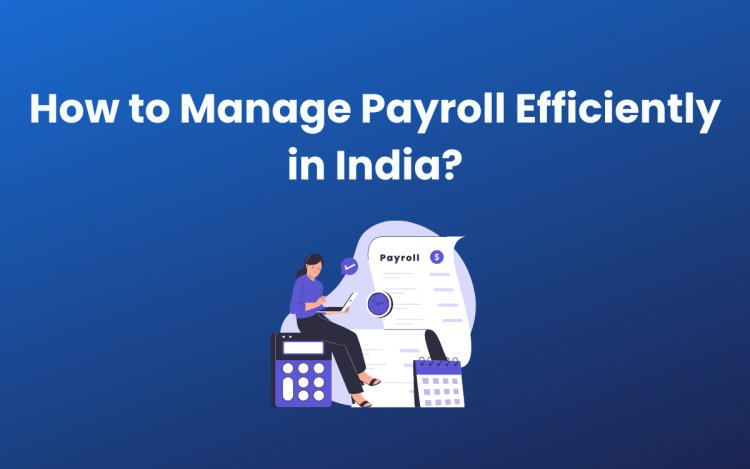Managing payroll in India involves more than just salary disbursal — it requires compliance with tax regulations, labor laws, and employee satisfaction standards. Whether you're a startup or a growing enterprise, finding a cost-effective payroll management solution can streamline operations and avoid penalties.
So, what's the best and most economical way to manage payroll in India? The answer lies in choosing the right blend of technology and outsourcing, depending on your business size and complexity.
In-House Payroll Management with Software
For small businesses with simple pay structures, managing payroll internally using reliable software can be both efficient and economical.
How In-House Payroll Works
1. Use of Payroll Software
Modern payroll software can:
-
Automate calculations for basic salary, TDS, Provident Fund (PF), Employee State Insurance (ESI), and Professional Tax
-
Generate digital payslips
-
Manage leave, attendance, and expense reimbursements
-
Offer employee self-service portals to reduce manual queries
Popular options: Zoho Payroll, RazorpayX Payroll, GreytHR (for startups), Keka, etc.
2. Dedicated Payroll Staff
Appoint an HR or accounts executive to:
-
Manage monthly payroll activities
-
Stay updated with Indian payroll laws and statutory compliance requirements
-
Maintain accurate employee records
3. Ongoing Compliance Training
Ensure your payroll personnel:
-
Know the latest updates to tax slabs and labor codes
-
Are trained to use software tools effectively
-
Can handle statutory filings (Form 24Q, PF returns, ESI returns)
Benefits of In-House Payroll
-
Lower operational costs for teams with under 10 employees
-
Complete control over employee data and salary disbursement
-
Faster internal decisions with instant access to payroll reports and analytics
Outsourcing Payroll Services
Payroll outsourcing in India is a smart option for medium to large companies or startups scaling rapidly with complex compensation structures.
Advantages of Payroll Outsourcing
-
Expertise on Demand: Service providers are up-to-date with Indian tax laws, minimum wage revisions, and labor reforms (e.g., new labor codes)
-
Compliance Assurance: Minimizes legal risks and errors in PF, ESI, TDS, and gratuity calculations
-
Saves Time and Resources: Your HR team can focus on core business operations
-
Technology Support: Most payroll vendors offer platforms with secure portals and real-time reports
Important Considerations
-
Data Security: Choose a provider with ISO-certified or GDPR-compliant security protocols
-
Vendor Transparency: Set SLAs for reporting, access, and turnaround times
-
Less Hands-On Control: Ensure you establish clear approval workflows
Top Indian payroll outsourcing companies: ADP India, Paybooks, Paysquare, Quikchex
Choosing the Right Payroll Method: A Comparative Table
| Company Size | Recommended Payroll Method |
|---|---|
| 1–10 employees | In-house using affordable or free payroll software |
| 11–100 employees | Advanced software or partial outsourcing |
| 100+ employees | Full-service payroll outsourcing |
Conclusion
Payroll management in India can seem complex due to tax and regulatory requirements, but it doesn't have to be costly. The best approach depends on your team size, budget, and compliance needs.
-
Use simple software solutions for basic needs and cost control.
-
Consider outsourcing if you're scaling or need expert compliance handling.
FAQs
What is the cheapest way to run payroll in India?
Using free or low-cost payroll software (like Zoho Payroll or RazorpayX Payroll) is ideal for companies with fewer than 10 employees.
Is payroll outsourcing worth it for small companies?
Generally, no. For very small teams, outsourcing may cost more than handling payroll in-house with software. It becomes worthwhile as employee count and complexity rise.
What are the compliance requirements in Indian payroll?
Key compliances include TDS deduction, Provident Fund (PF), Employee State Insurance (ESI), Professional Tax, and Gratuity. Monthly and annual filings are mandatory.






